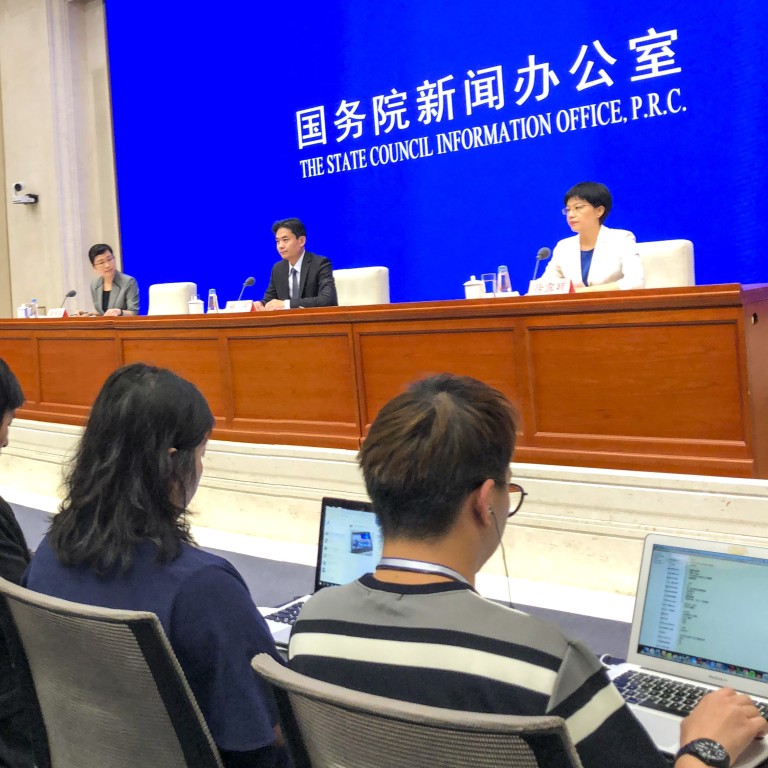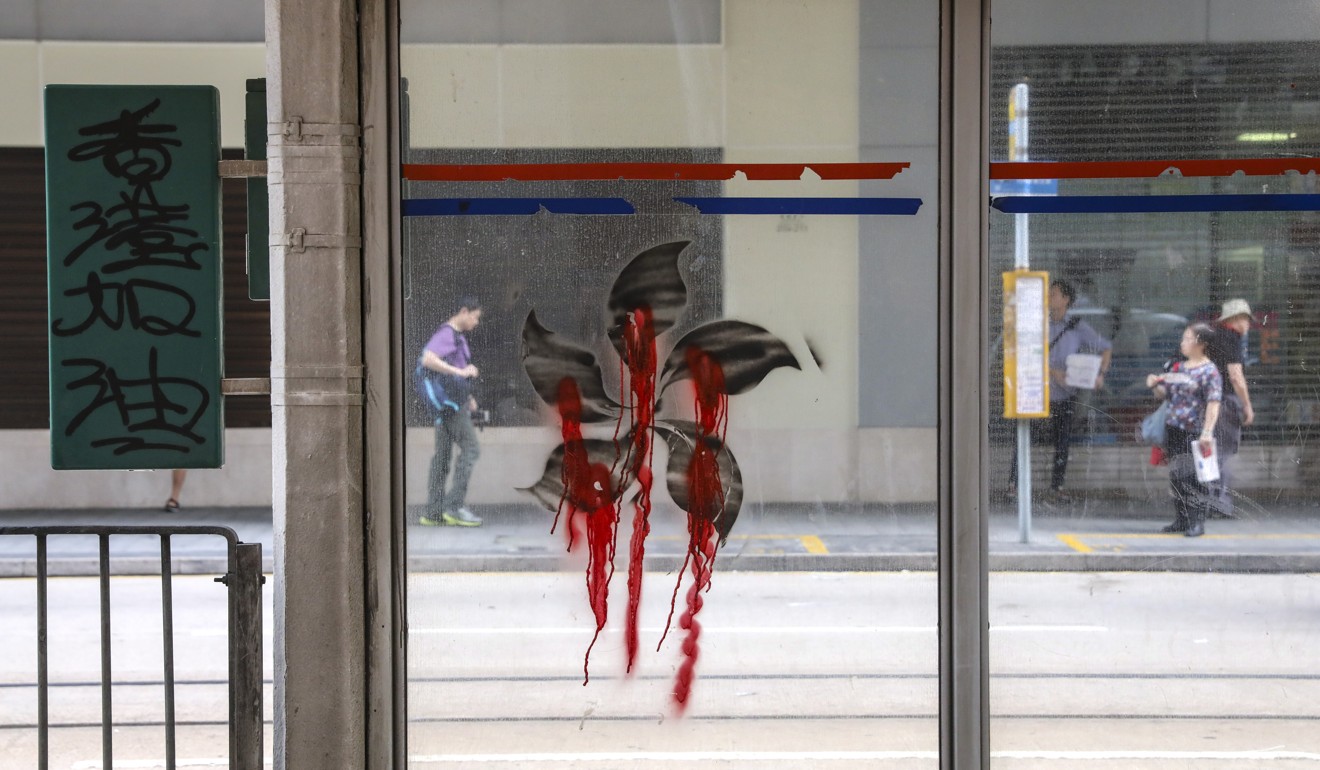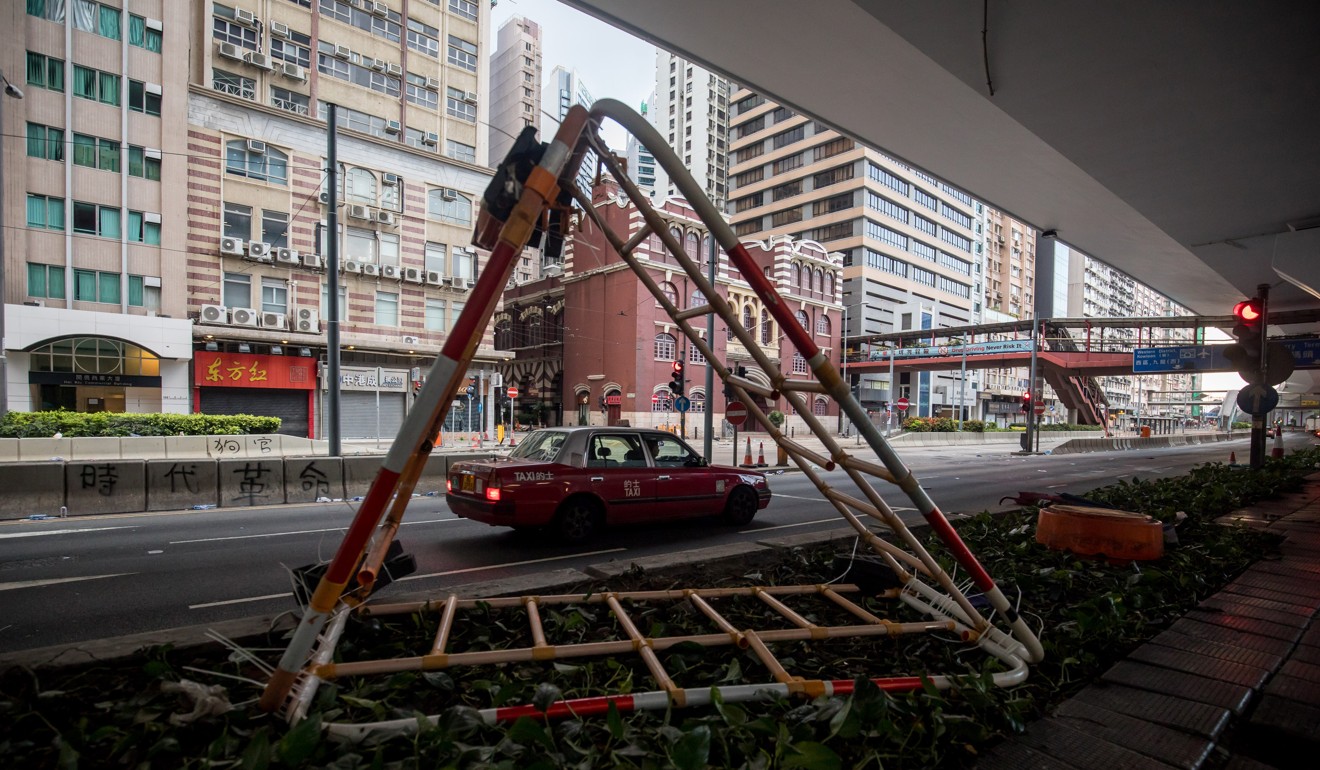
Beijing tells Hong Kong return to normality ‘the most pressing priority’ in response to unrest and protests that followed extradition bill controversy
- Hong Kong and Macau Affairs Office also heaps praise on city’s police force, which is under fire over its handling of anti-government protests
- Spokesman Yang Guang reiterates support for embattled Chief Executive Carrie Lam and urges public to oppose use of violence
Beijing made it clear to Hong Kong on Monday that a return to law and order should be “the most pressing priority”, and praised the city’s beleaguered police officers in an unprecedented show of support, despite heavy public criticism over allegations of excessive force used against anti-government protesters.
Beijing’s eagerness to ease tensions and see the city returning to normality was evident at the HKMAO’s first press conference on Hong Kong since its return to Chinese sovereignty in 1997. Office spokesman Yang Guang reiterated the central government’s support for embattled Hong Kong Chief Executive Carrie Lam Cheng Yuet-ngor and urged the Hong Kong public to oppose the use of violence.
But the most striking part of the 40-minute press conference was the HKMAO’s undiluted praise for Hong Kong police, who are grappling with criticism from all sides for their handling of the massive, often violent, anti-government protests.
MTR staff threaten to strike as rail operator battles to restore morale
“We understand the huge pressure facing the Hong Kong police and their families, and would like to salute the Hong Kong police who have been fearlessly sticking to their posts and fulfilling their duties against all odds,” Yang said.
Protests in Hong Kong had gone “far beyond the scope of peaceful marches and demonstrations”, he noted, and had undermined the city’s prosperity and stability.
Yang, however, did not use the words “riots” or “rioters” to describe the civil unrest in the city.
Unless Hong Kong is totally out of control, the central government does not want to get involved
Even those who defaced the national emblem and spray-painted anti-Chinese slogans on the central government’s liaison office building in Sai Ying Pun last week were merely described by him as “a small number of radicals”.
Instead, he focused on appealing to Hong Kong people to defend the rule of law as a core value of the city and a cornerstone of its success.
“We must not sit idly by and let a small number of people trample on this important value,” he said. “No matter how noble their self-claimed goal is, what is illegal is illegal. We must oppose violence and support police to take action.”

Escalating social unrest in Hong Kong has grabbed headlines around the world and thrust the city into the global spotlight. For three consecutive weekends, riot police have battled protesters in some of the world’s busiest urban areas.
By inviting journalists around the world to its unprecedented press conference, the HKMAO was trying to ease concerns that the situation in the city would escalate further.
Civil servants plan extradition bill protest, piling pressure on Lam
When asked if Beijing had ever considered removing the chief executive, whose ill-advised legislative proposal to allow the transfer of criminal suspects to jurisdictions including the mainland triggered the political crisis, Yang said the central government would “resolutely” support Lam.
He said Lam had already acknowledged there were shortcomings in her policies and promised to take steps to improve her governance.
China watcher Johnny Lau Yui-siu said it suggested Beijing’s support for Lam was not unconditional and was based on practical needs.
“Carrie Lam is facing increasing opposition from the pro-establishment camp, civil servants and even the police. Beijing has to back her at this moment,” Lau said.
However, he noted that Beijing had distanced itself from the Hong Kong government’s decisions over the extradition bill.
Yang sidestepped the question of setting up an independent inquiry into the police handling of the protests – one of the key demands of those constantly taking to the streets.
He said the most pressing issue for the city now was to stop criminal and violent activities and restore law and order.
Hong Kong police chief proud of how officers have handled extradition bill protests
Yang also lashed out at some foreign critics for making “irresponsible and “laughable” comments about Hong Kong. He warned China would not tolerate any foreign intervention.
His comments drew mixed reactions.

Opposition lawmakers from the pan-democratic camp decried it as another sign that Beijing had lost touch with the Hong Kong public and misunderstood the root causes of their grievances.
“Everybody knows the core issue is a political problem. [If we] focus on chaos stemming from the political problem instead of addressing the problem itself, it is putting the cart in front of the horse,” said education-sector lawmaker Ip Kin-yuen.
Legislator Raymond Chan Chi-chuen was worried that with Beijing’s support, police would become “even more relentless in their use of force”.
Ex-leader CY Leung excoriates school official over anti-police remarks
Police Inspectors’ Association Chairman Wilkie Ng Wai-kei, on the other hand, described Yang’s comments as “truly supportive”. He said it showed Beijing’s appreciation of their hard work.
Albert Lee Yiu-ting, spokesman for the Junior Police Officers’ Association, which represents 25,000 officers, also welcomed Yang’s vote of confidence. Lee warned that police would not tolerate violence against officers.
Most mainland Chinese analysts described Yang’s comments as soft and moderate.
“It shows Beijing is still patient and tolerant. It wants to win over the majority in Hong Kong by making a difference between peaceful demonstrations and unlawful protests and violence,” said Zhang Dinghuai, an expert on China’s Hong Kong policy at Shenzhen University.
Li Huan, an expert at The Chinese Association of Hong Kong and Macau Studies, said the central government saw the police force as the city’s “pillar of stability” and wanted to offer law enforcers some encouragement in their moment of crisis.
Jailed pro-independence activist urges youth to shun hatred in extradition bill protests
“Hong Kong police and Hong Kong civil servants are the two keys to uphold the principle of ‘Hong Kong people governing Hong Kong’,” he said. “Some civil servants have already violated the principle of political neutrality [by joining the demonstration]. Police so far are carrying out their duty faithfully. They deserve support.”
Tian Feilong, associate professor at Beihang University’s Law School in Beijing, said the central government was still hopeful that Hong Kong could resolve the crisis by itself.
“Unless Hong Kong is totally out of control, the central government does not want to get involved,” he said.


